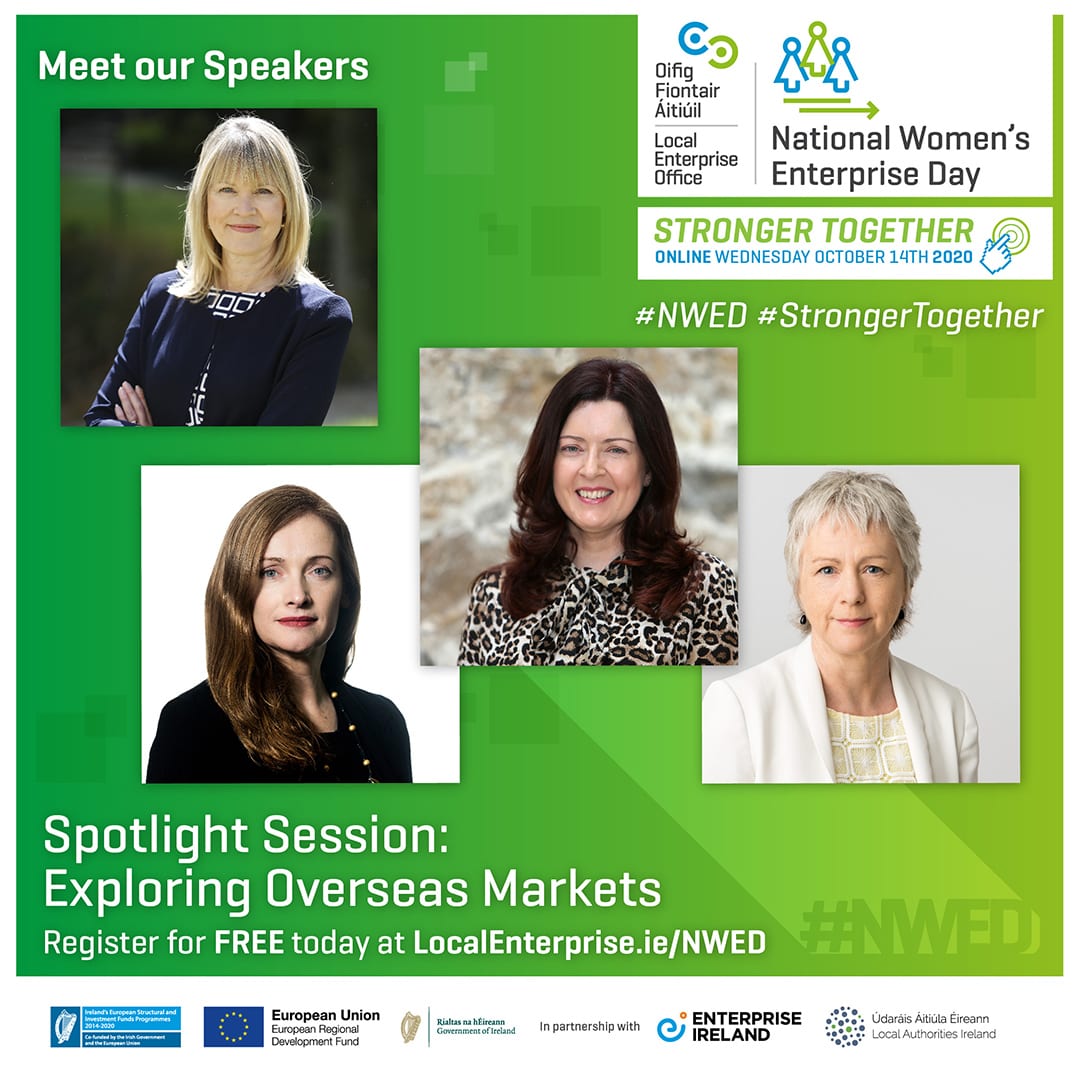Market Watch Industry Bulletin – Aerospace & Aviation

If you are considering doing business in Italy, please be sure to explore our tips to enter the market below and also be sure to reach out to our team in Milan.
If you are considering doing business in Italy be sure to reach out to our team and read our Going Global Guide for more information.

National Women’s Enterprise Day 2020, organised by the Local Enterprise Offices, was like no other in that, because of Covid, for the first time in its 14-year history, it took place entirely online.
In all other ways, it was exactly the same – providing women with the inspiration, support and confidence to start and grow a business.
Sheelagh Daly, Entrepreneurship Manager at Enterprise Ireland, has been involved in this flagship event for women in business right from the start.
National Women’s Enterprise Day was an initiative set up by the Local Enterprise Offices in 2007, supported by Enterprise Ireland.
“Back then the landscape was quite different in that there was a dearth of female entrepreneurial role models. If you went back and looked at the newspapers, for example, there weren’t many women being profiled in a business or entrepreneurial setting,” says Daly.
“Research shows that role models are an important way to inspire women and give them the confidence to start a business. So we knew we needed to profile women who had done it successfully already. It was that whole concept of ‘to be it you have to see it’,” she says.
But a lack of role models wasn’t the only challenge.
“At the time there was also a real lack of access to business networks for women. While the Chambers of Commerce were, of course, important, they tended to be for more established businesses. More informal networks, such as rugby clubs and golf clubs, didn’t provide the same level of access to women.”
There was a need for “a mechanism to provide women with access to networks in order to inspire, demonstrate and build confidence in female entrepreneurship,” she says.
National Women’s Enterprise Day was just the mechanism.
“It was also a means to disseminate the huge range of supports available from lots of different government agencies, not just from Local Enterprise Offices and Enterprise Ireland, but from Intreo, Failte Ireland and the Credit Review Office,” she explains.
“The idea was to bring all these things under one roof, on one day, with one big bang that would put female entrepreneurship on the map.”
It did just that. “The first event was held in Mullingar and was fantastic, and overbooked, so we carried on.”
Indeed, the event grew so much that in recent years the Local Enterprise Offices have run regional versions too, to enable even more women to attend.
All followed the same proven format of enabling participants to listen to successful women at different stages of their business journey, to gain an understanding of the supports available to them, and to have an opportunity for networking.
“Then, in 2020, we had Covid,” she says.
Having supported so many businesses to ‘pivot’ to online to cope with the pandemic, the network of Local Enterprise Offices were quick to do the same with National Women’s Enterprise Day. It took place on Wednesday 14th October, entirely remotely, and was a huge success.
“We saw an enormous attendance of 1641 people which was amazing and well reflected this year’s theme of ‘Stronger Together’,” says Daly.
Speakers included Olympian turned businesswoman Derval O’Rourke, who talked about the strength, discipline and resilience required to deliver peak performance in one sector before pivoting to another.
Sonia Deasy, founder of international beauty brand Mortar & Pestle, spoke about her journey taking a brand from “local to global”.
A series of ‘leading lights’ included successful female entrepreneurs across a range of sectors, from Clare Hughes of CF Pharma in Kilkenny to Mary Walsh of Ire-Wel Pallets in Wexford and Odilon Hunt of AVA Audio Visual in Sligo.
Sheelagh Daly hosted a panel discussion entitled “Exploring Overseas Markets”, featuring expert commentary from Anne Lanigan, Enterprise Ireland’s Regional Director Eurozone, and Marina Donohoe, Enterprise Ireland’s Director for UK and Northern Europe.
As well as exhorting female entrepreneurs to explore Eurozone markets, they pointed out that the UK will always be hugely important to Irish businesses too.
Marcella Rudden, Head of Enterprise with Local Enterprise Office Cavan explained the questions to address when starting your export journey.
“She spoke about how to choose a market to target and how the Local Enterprise Office should be your first port of call because it has the supports to help you, both financial and otherwise,” says Daly.
One of the main threads running through the day was not to be afraid of exporting, she says. “The message was that it isn’t something that should be seen as intimidating and that there is help available.”
That help is not just from Local Enterprise Offices but from all sorts of sources, including networks for women in business in countries such as France and Spain, delegates heard.
“Before you commit to a market do the research, make sure that it’s the right market for you and that you can compete in it, and don’t be afraid to ask for help,” says Daly.
Information is crucial. Both men and women have similar business ambitions but research indicates that women take a more cautious approach, including in areas such as borrowing for business. They typically “prefer more information before they take a risk”, says Daly.
“The ambition is very much there but the approach is different.”
National Women’s Enterprise Day 2020 took place in a year which also saw the launch of Enterprise Ireland 2020 Action Plan for Women in Business. This important six-year strategy to support female entrepreneurship was launched in February, just before Covid.
“The reason such emphasis is being put on women is because we are still looking at a much higher proportion of men in leadership and entrepreneurship,” explains Daly.
This needs addressing because, both as an economy and a society, we “need the skills and talents of all our population to be realised,” she says.
We also need those businesses that are started to be the best they can. “All the research demonstrates that the greater the diversity the stronger, more profitable and faster-growing the business,” says Daly.
“That leads to wider economic benefits, so it’s a real economic imperative that everybody, regardless of gender or other diversities, does not face barriers when it comes to starting or growing a business.”
The video interview discusses the effects of the current Covid-19 situation on new technologies, forecasts on the industry and alternative ways of connecting with stakeholder in the market.
See the webinar here.
In this time of uncertainty and disruption, Irish BPO and IT companies have demonstrated impressive flexibility in providing their outsourced services to ensure international companies can overcome these engagement challenges from a remote setting and provide a positive customer experience.
Following Enterprise Ireland’s recent Industry Bulletin which looked at developments across the world affecting Irish BPO and IT Services companies, this edition of our Market Watch series focuses on the UK region and a key end-market for many Irish companies; the UK energy sector.
This webinar reflects on the
Panellists:
David Corcoran, Senior Market Advisor, Enterprise Ireland UK
Peter Haigh, former Managing Director of Bristol Energy, CEO of ELEXON, and Director of Business Retail at E.ON.

The Enterprise Ireland Belgium and Luxembourg team are here to help you prepare, launch and succeed in your export activities. We are eager to share the expertise and network gained from studying, working and living in the market. Don’t hesitate to get in touch with our team of dedicated Market Advisors to help you with your export strategy.
Belgium truly is the heart of Europe and has proven itself to be a hub of international business and networking, a large market in its own right, and also a great test market for companies with the ambition to grow and scale in the wider European region.
For more be sure to read our Belgium Going Global Guide
Luxembourg may be one of the smallest EU countries, but has become world leader in finance and administration, hosting 3,900 investment funds and fostering new opportunities for SME’s.
Finally, do your research! Explore the different resources available from Enterprise Ireland to delve deep into the market and really understand the opportunities and challenges that will arise. Our world-class Market Research Centre provides countless market reports, and MA’s are happy to help with market-related requests.
For more be sure to check out our Going Global Guide Luxembourg
A typical smartphone, for example, is made up of components and materials sourced from up to a dozen suppliers on multiple continents, which are shipped to a manufacturer for final assembly before being sent onwards to distributors, retailers and ultimately sold to consumers.
This presents two major problems for manufacturers and others involved in the chain – visibility and provenance. A new project led by Dublin-based Exertis Supply Chain Services, with funding from Ireland’s Disruptive Technologies Innovation Fund (DTIF), is aimed at solving both of them.
A subsidiary of DCC, Exertis Supply Chain Services is a leader in materials supply chain design and operation. “Our focus is on technology and we provide global supply chain capability for the Exertis group and clients across the globe,” says Brian Cassidy, Head of IT and Director responsible for data protection with the company. “We are also a centre of excellence within the group for the use of blockchain technology.”
The Disruptive Technologies Innovation Fund is a €500 million fund run by Ireland’s Department of Business, Enterprise and Innovation, as part of the National Development Plan under Project Ireland 2040. It is administered by Enterprise Ireland, the trade and innovation agency. An example of the country’s strong focus on developing some of the world’s most innovative companies, the initiative funds collaborations between research facilities and ambitious companies to develop innovative technologies that change the world in which we live.
The objective of Exertis’s DTIF-supported project, which also involves Dublin-based technology company Sonalake and the CeADAR Technology Centre located at University College Dublin, is to develop a blockchain-based platform, which will transform the technology product supply chain.
“We are using the blockchain to provide a peer-to-peer platform for authenticating provenance and we are providing visibility across the supply chain where multiple partners and a high volume of products are involved.”
The current lack of visibility and difficulty with provenance result in a number of issues. “In terms of visibility, for any participant in the supply chain it is very difficult to know what is selling and what is not,” says Cassidy.
This lack of visibility leads to problems with availability. “Typically, the retailer might know what the distributor has in stock but won’t know what the manufacturer has. Visibility is very much limited to one point up or down in the chain. A manufacturer may not know how much product distributors or retailers have because they usually don’t share that information.”
Provenance is another issue. “When the item does arrive at the retailer, proving its authenticity can be a really interesting challenge. If a fake product comes into a customer’s hands, a manufacturer wants to be able to see how it got there.”
The Exertis project is highly innovative in that it will provide an open platform for multiple users in multiple supply chains, with each participant being able to decide which other members of the chain they wish to share information with. Furthermore, it will allow them to share selected pieces of information with selected participants.
Once the data gets put on the blockchain it is immutable and cannot be deleted. “It is encrypted and decrypted at a granular level,” Cassidy adds. “A retailer might want to put a transaction on the platform but may not want competitors to know anything about it, whereas they do want the distributor and manufacturer to know. However, they may not be able to share with the manufacturer certain details such as the price they paid for it or what they sold it for. They can decrypt different parts of that dataset for different partners and their ERP system will be able to dynamically decide what information to share and who to share it with.”
Manufacturers will be able to see what is selling and how much product is in the channel in real time. This is important for planning manufacturing output, as well as for managing warranty liabilities. “Manufacturers will usually know how many units were sold, but don’t know exactly when. They need to know that for when the warranty starts. This platform will address that issue. It provides a place where all participants in the chain can contribute, but everyone controls their own data.”
Initial work on the project, began in 2018, with the DTIF-supported three-year project beginning in earnest in August 2019. “The DTIF funding has accelerated this project significantly and facilitated our collaboration with CeADAR and Sonalake. At Exertis, we have looked across our business and identified several exciting use cases, which we expect to roll out in several areas in the coming years”.
For more information and call dates for the Disruptive Technologies Innovation Fund visit the Department of Business, Enterprise and Innovation website.

Download the bulletin here.
The video interview took place on 10th March 2020, prior to Covid 19 restrictions.
Up until the pandemic, the biggest challenge facing many firms was attracting and retaining talent. That hasn’t changed, says Ryan Williams, CEO of Conscia, a training provider which specialises in employee engagement.
Conscia is the architect of a series of online modules designed to help companies maintain employee engagement throughout the Covid-19 crisis.
Each provides practical steps to take, plus easy to use templates and frameworks, to help companies maintain their employee value proposition (EVP).
Those that succeed in doing so will not only optimise productivity throughout this current, difficult time, but will be well placed to capture the opportunities of the post-pandemic surge.
Those that neglect employee engagement, however, risk damaging their reputation as an employer of choice long into the future. “It’s about asking yourself, how you want your company to be remembered after this pandemic,” says Williams.
Your EVP is an invaluable retention tool and should be robust enough to support employees in good times and in bad, he points out.
“The market for talent will be equally as competitive when we come out the other side of this as it was when we went in,” says Williams.
“Though some sectors will suffer more than others, the fact remains that if you needed a software developer before this, you will still need one after it, so it is important to get the best talent that is out there.”
The top priority for employers right now is communication.
By this stage new work practices will be established, either from home or, socially distanced, in the workplace.
“The novelty of the early stages has well and truly worn off, the buzz of setting up meetings on MS Teams and Zoom has ebbed, and people are starting to feel this will never end. The risk is that employers stop communicating when in fact it is vital to over-communicate now and throughout this process.”
In a period characterised by uncertainty and anxiety, it’s important to display “honest confidence” he says.
“Be honest and transparent and deliver your communications with confidence, even if it is bad news, such as, perhaps, having to take a pay cut to get through this. People can cope if they realise there is light at the end of the tunnel.”
Empathetic leadership is essential. “You need to communicate your company’s vision and mission with empathy. It’s about understanding that your people are going through challenging times.”
Weekly ‘all hands’ meetings online are an opportunity to show that everybody is part of what is a communal effort.
“Be very honest about what you do and don’t know. The rumour mill can be difficult to manage so share the good, the bad and the ugly with honest confidence.”
Decision making in a time of crisis should be quick and decisive, with resources allocated speedily. Employee polls are a quick and effective tool for effecting change, offering maximum transparency and ‘buy in’.
Regular, scheduled and consistent communications help keep fear and anxiety at bay. Use video as much as possible. “People want to see their leaders.”
Be cognisant of the impact not just of your words, but of your tone and body language too. “Lean forward, be expressive, use your hands,” he says.
As well as large town hall type, and team meetings, make sure to set aside time for one to ones, to check in with people and see how they are doing.
Recognise and reward output. “Celebrate team wins and individual efforts more than in ordinary times. People are doing fantastic things right now so make time for shout outs in meetings and promote them on your social media too.”
Fostering ‘water cooler’ moments online helps to replicate the everyday interaction of the traditional workplace. “Don’t lose your social cohesion.”
At every step, focus on building trust and loyalty. “Very many companies have spent years building up their culture. Don’t lose it. Find new ways of maintaining it instead.”
Social distancing will likely continue for some time, as will working from home. “We are all living with uncertainty at present, so ‘What does this mean for me?’ is the key question people have. While you can’t control this, you can help by removing as much of the uncertainty for employees as possible.”
The current situation provides a great opportunity for learning and development. “This doesn’t have to cost you money,” he points out.
“It could be online learning opportunities, or a situation where an experienced member of staff helps train up others on a new software tool, such as cucumber. It could be a buddy system, where someone experienced is matched with someone who may be feeling overwhelmed.”
Spare capacity could be given over to executing planned projects that had previously been put off. “We have one client company, for example, who built an entire logistics platform in eight weeks, a project it had long wanted to do,” says Williams.
Such initiatives help provide purpose, an important component in employee engagement.
Set short term goals for long term results. “Focus on bite sized projects to help people navigate through.”
Finally, stay positive. “Remember, this is different from the financial crisis because it is the same for everybody. From Ireland to China to the US, the base line has lowered for everyone. So, while there is uncertainty, and a need to paint as honest a picture as possible, it’s also important to look to where the opportunities will be post-pandemic.”
To find out more about building employee engagement during the Covid-19 restrictions see here.
Download the bulletin here